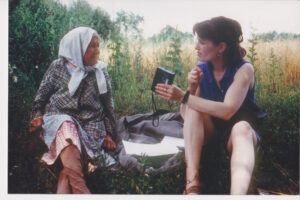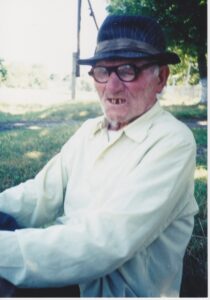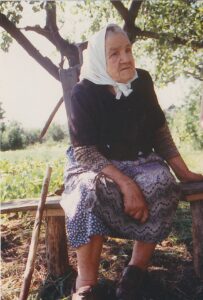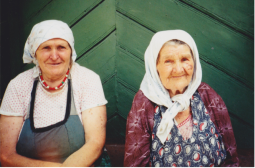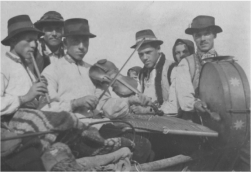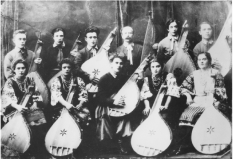Andrii Solomonovych Zaiets (Kharkiv region)
—Who set up the kolhosp in your village?
Andrii Solomonovych: They organized a meeting with the head of the village council and some kind of a representative from the regional administrative center. They took notes on who did not want to join the kolhosp. In our village, thirty people applied to join. They noted it.
—Did you join the kolhosp?
Andrii Solomonovych: Yes, I joined.
—Why did you want to join the kolhosp?
Andrii Solomonovych: I wanted to join because one had to. After a year of working there, they documented all my possessions and took all of them away.
—Did you think that they would not take your property if you joined the kolhosp?
Andrii Solomonovych: I did think that, but… Then I was taken by the military recruitment office for a ten-day meeting. A representative there asked me if I was in the kolhosp or if I was dispossessed? I said I was in the kolhsop and all my property was confiscated after one year of work. He picked up the phone right away and called Kobzarivka, asking why I was dispossessed. After some questioning, he said, “Your property will be returned.” I came home and saw the brigade that used to go to people’s houses and evict people. One man was sitting on the bed, and the other on the bench. One threw the keys at me. I said, “You can eat them. Pick them up, you fool!” That was all.
Andrii Solomonovych Zaiets (Kharkiv region)
—Was your father’s property confiscated when the kohosp was being set up?
Andrii Solomonovych: His horse was taken; he didn’t have a cow at the time.
—Did he join the kolhosp right away?
Andrii Solomonovych: No, he didn’t.
—He never joined?
Andrii Solomonovych: No. He perished while working on the radhosp after his family died.
—Was he forced to join the kolhosp?
Andrii Solomonovych: Everyone was forced. One person was forced into it and his house was confiscated and turned into an administrative office. We were joined to Kobzarivka. Ten homesteads here, thirteen homesteads there. Then these kolhospy were merged together.
—Were the kurkuli exiled from the village?
Andrii Solomonovych: Well, yes. The chair of the village council would pay a visit to them and say, “Yosyp Stefanovych, I know you. I will evict you from your house tomorrow.” So, he was evicted and deported.
—Was he someone who didn’t want to join the kolhosp?
Andrii Solomonovych: Yes, he didn’t want to join. “I won’t go, that’s all.”
—What did they do to him?
Andrii Solomonovych: Nothing was left in his house; everything was taken into the kolhosp. One economically poor woman moved into his house and started living there. All kinds of things used to happen.
…………………………………………..…..……………..…
—Was there a famine in 1933?
Andrii Solomonovych: You know, they created it back then. They didn’t give people any grain, so the people would join the kolhosp. People had nothing to eat and were falling as pears fall from a tree. Then they started joining the kolhosp. When everyone joined and started working there, they would get two kg of bread per workday, sometimes seven hundred grams per workday. For example, I got 1.3 kg of bread for 1.5 workdays.
Andrii Solomonovych Zaiets (Kharkiv region)
—Why was there a famine in 1933?
Andrii Solomonovych: You know, they created it back then. They didn’t give people any grain so that they would join the kolhosp. People had nothing to eat and were falling as pears fall from a tree. That was when they started joining the kolhosp. When everyone had joined and started working there, they would get two kg of bread per workday, sometimes seven hundred grams per workday. For example, I got 1.3 kg of bread for 1.5 workdays.
Andrii Solomonovych Zaiets (Kharkiv region)
Andrii Solomonovych: We got two kilograms of bread per workday; sometimes 1.5 kilograms or 700 grams. For example, I worked 1.5 days today and got 1.3 kilograms.
……………………………………………………………………………………….
—Where did people get the money to buy things?
Andrii Solomonovych: We used to wear linen clothes that we dyed using elderflower. They imposed large loans on us at the time. They’d charge you eight hundred or a thousand rubles, and you had to pay. They would come to your house, sit down, and sign papers. I came home once, and they were there, “Here. Sign this.” — “No, I won’t sign.” Next day, they would come late in the evening or at night, to put more pressure. There was no money back then.
—If you signed, you had to pay the money?
Andrii Solomonovych: No, it was to make you pay later. This was back in the day.
Andrii Solomonovych Zaiets (Kharkiv region)
—Did people steal from the kolhosp at the beginning?
Andrii Solomonovych: It would happen. Especially during the famine. Good Lord! A person would get into the rich men’s barn from beneath the floor and make a hole in the bin to steal some grain. Then he’d bring it home, grind it, and make pancakes. People also ate beets, dried pears, weeds—whatever they could get because they were swollen from famine. We had thirty households in Zaikivka, and fifty-eight people died of famine in 1933. During the war, eighteen—only eighteen—people were killed from our khutir. That famine was the internal war; they set up the famine and fifty-eight people died. One young man came to my house and took some sauerkraut from my cellar to eat. I followed him and saw that he had a family of seven, his wife was blind, and the man was old. Would I take the sauerkraut back? I thought I still had some left and I had only one child and two of us in the family. I ate some, and the rest could go bad. I thought to myself, “I’m alive today and will live another day.”
Andrii Solomonovych Zaiets (Kharkiv region)
—Were the kurkuli exiled from the village?
Andrii Solomonovych: Well, the head of the village council came, “Yosyp Stefanovych, I know you. I’ll evict you from your house tomorrow.” This was how they dispossessed and arrested people.
—This man didn’t want to join the kolhosp, did he?
Andrii Solomonovych: No, he didn’t want to, “I won’t go. That’s all.”
Andrii Solomonovych Zaiets (Kharkiv region)
—Tell us about your entertainment when you were a young man.
Andrii Solomonovych: In the summer, girls and boys used to gather in the grazing field and sing. In the winter, we’d gather for the vechornytsi. Girls would sew and embroider, except on Fridays. They didn’t spin yarn on Fridays. We used to pay for kerosene for the vechornytsi. Each of us fifteen guys would contribute one kopek, so we had enough kerosene. A liter of it cost three kopeks at the time.
—Who collected the money?
Andrii Solomonovych: Well, suppose I’m hosting the vechornytsi, so I’ll collect the money, buy the kerosene, and let people into my house.
—What did boys do at the vechornytsi?
Andrii Solomonovych: Nothing. They would just play cards.
—Did they stay to sleep with the girls?
Andrii Solomonovych: Yes, sometimes.
—Did the guys go to other villages?
Andrii Solomonovych: Yes, to Kobzarivka.
—What about the girls?
Andrii Solomonovych: No, they didn’t.
—Why?
Andrii Solomonovych: Well, you know, this wasn’t customary. Guys would go and have fights there.
Andrii Solomonovych Zaiets (Kharkiv region)
—Did any startsi come to your khutir?
Andrii Solomonovych: No. Only the paupers used to come with their bags, asking for alms.
—Did they come into the house or into the backyard?
Andrii Solomonovych: There was another man with a bandura, a long one with a handle [he is describing a lira]. He would play, dance, and recite verses.
—How did he play?
Andrii Solomonovych: He would adjust something on the handle and pull the strings [of the lira] here.
—Who did the dance?
Andrii Solomonovych: This was not in our village. Those who would come could do a dance—the boys, I mean, the kids.
—What did the old man sing?
Andrii Solomonovych: Some songs. People gave him whatever they could—a piece of lard, eggs, or some flour, especially in the winter when people were celebrating the holidays.
—Did your village Zaitsivka have its own blind starets?
Andrii Solomonovych: No.
—What about in Mynkivka?
Andrii Solomonovych: I don’t know because I was very little at the time.
—Were there any blind startsi near the church?
Andrii Solomonovych: Who knows? It was long ago, and I’ve forgotten much.
—Did they go around the villages during collectivization?
Andrii Solomonovych: No.
—Why?
Andrii Solomonovych: For some reason they were forbidden to go door-to-door.
—Why was this?
Andrii Solomonovych: I don’t know. It’s not my business.
—Did you see a kobzar?
Andrii Solomonovych: Taras Hryhorovych Shevchenko is a kobzar.
—I mean kobzari-musicians.
Andrii Solomonovych: I haven’t seen any.
